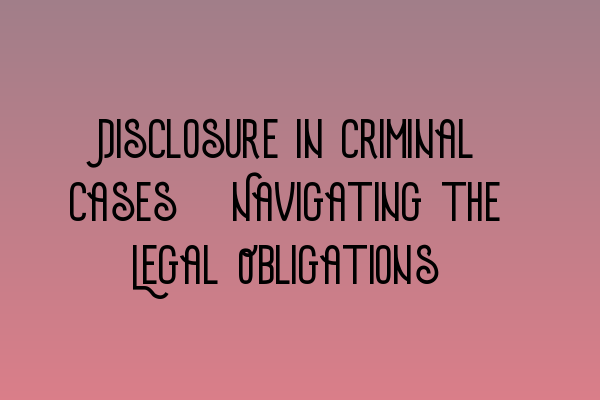Disclosure in Criminal Cases: Navigating the Legal Obligations
In criminal cases, the concept of disclosure plays a critical role in the pursuit of justice. It involves the sharing of relevant information between the prosecution and defense, ensuring that both sides have access to all necessary evidence. By ensuring a fair and transparent legal process, disclosure helps to uphold the rights of the accused and maintain the integrity of the criminal justice system.
Understanding the Legal Obligations
As a solicitor practicing criminal law, it is crucial to have a comprehensive understanding of the legal obligations surrounding disclosure. Failure to meet these obligations can have far-reaching consequences, including the collapse of a case or an unfair trial.
The legal obligations regarding disclosure can be found within the Criminal Procedure and Investigations Act 1996. This legislation sets out the requirements for disclosure and ensures that all parties involved in a criminal case have access to relevant evidence.
Key concepts within the act include the disclosure of unused material, which refers to any material that is not being relied upon by the prosecution but may be relevant to the defense. It is important to note that the definition of unused material is broad and can include a wide range of items, such as witness statements, CCTV footage, or expert reports.
The Role of the Solicitor
As a solicitor representing a defendant in a criminal case, your role is to navigate these legal obligations with precision and diligence. It is essential to thoroughly review all available evidence and effectively communicate with the prosecution to ensure that all relevant material is disclosed.
Your understanding of disclosure obligations will directly impact the defense strategy and the ability to effectively challenge the prosecution’s case. By conducting a comprehensive analysis of the disclosed material, you can identify inconsistencies, factual errors, or potential weaknesses in the prosecution’s evidence.
Furthermore, by utilizing the expertise of forensic and investigative professionals, you can uncover additional evidence that may strengthen your client’s case. This may involve seeking expert reports or conducting its own investigations to challenge the prosecution’s narrative.
It is important to remember that disclosure is an ongoing process and should be monitored throughout the duration of the case. As new evidence arises, it is essential to assess its relevance and promptly disclose it to the defense.
Challenges and Strategies
Navigating disclosure obligations can be complex, and there are several challenges that solicitors may encounter. These challenges include the volume of material, varying interpretations of relevance, and issues with the timeliness of disclosure.
To overcome these challenges, solicitors can employ various strategies. Firstly, proper case management is essential. This involves organizing and categorizing disclosed material in a systematic manner, making it easier to identify key evidence and inconsistencies.
Secondly, effective communication with the prosecution is crucial. By establishing a professional relationship, solicitors can address any concerns or disputes regarding disclosure promptly. Clear communication can help to resolve issues and ensure that relevant evidence is shared in a timely fashion.
Lastly, utilizing technology can streamline the disclosure process. Advanced software and digital tools can assist in the analysis and organization of large volumes of information, saving time and increasing efficiency.
At SQE Criminal Law & Practice Law UK, we understand the importance of disclosure in criminal cases. Our team of expert solicitors has extensive experience in navigating disclosure obligations, ensuring that our clients receive a fair and robust defense.
If you are preparing for the SQE 1 or SQE 2 exams, we offer comprehensive preparation courses to help you succeed. Our SQE 1 Practice Exam Questions and SQE 1 Practice Mocks FLK1 FLK2 are designed to test your knowledge and enhance your understanding of criminal law.
To stay updated with the latest SRA SQE exam dates, visit our website. We provide regular updates on examination schedules and other important information to help you plan your preparation effectively.
In Conclusion
Disclosure is a fundamental aspect of criminal cases, ensuring a fair and transparent legal process. As a solicitor, it is essential to navigate the legal obligations surrounding disclosure with precision and diligence. By understanding the legislation and employing effective strategies, you can protect the rights of your clients and provide them with a robust defense.
For more information about our SQE 2 Preparation Courses or SQE 1 Preparation Courses, contact SQE Criminal Law & Practice Law UK today. Our team of experts is dedicated to helping you succeed in your legal career.
